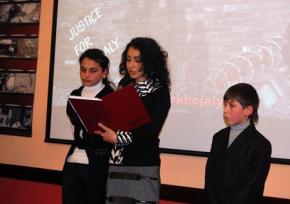ID :
162716
Mon, 02/21/2011 - 11:20
Auther :
Shortlink :
https://www.oananews.org//node/162716
The shortlink copeid
Memory of Khojaly genocide`s victims honored in Ukraine

Baku, February 21 (AzerTAc). The Islamic Conference Youth Forum (ICYF), Ukrainian Azerbaijanis Youth Union (UAYU) and the Congress of Kharkhov Azerbaijanis co-organized a commemorative event to mark the 19th anniversary of the Khojaly genocide.
Officials of the Kharkhov administration, activists of Azerbaijani Diaspora and representatives of local TV and other media outlets attended the event as part of the “Justice for Khojaly” campaign.
Participants laid flowers at the memorial plaque to national hero of Azerbaijan Victor Seregin, who was killed in a helicopter blown up by the Armenians. The helicopter was evacuating civilians from the battle zone in 1992.
The mass killing of civilians in the Azerbaijani town of Khojaly 19 years ago is what chairman of the Congress of Azerbaijanis in Kharkhov Gurban Abbasov considers the continuation of genocidal and aggressive policy against the Azerbaijani people over the last two centuries.
Chairman of the Turkish National Union Irfan Gebeci, chairman of the Georgian Diaspora Zurab Kiviya and others described the developments in Khojaly as an outrage on humanity and urged the international community and international organizations to give political and legal assessment to this massacre.
Chairman of the regional organization of the Union Aphiaddin Balakhishiev and other representatives highlighted Azerbaijani youth`s joining the “Justice for Khojaly” campaign and their all efforts to educate the world community about the truth on the Khojaly bloodshed.
A documentary film "Khojaly genocide” by Heydar Aliyev Foundation has been screened at the event.
A number of actions and protests on the initiative of Islamic Conference Youth Forum, Ukrainian Azerbaijani Youth Union will be held until the end of February within "Khojaly Month" in Ukraine.
The Armenian military forces committed genocide in Khojaly on Feb. 26, 1992. More than 600 people were killed, including 63 children, 106 women and 70 old men. A total of 1,000 civilians were disabled during the genocide. Eight families were annihilated, 130 children lost one parent, and 25 lost both. Additionally, 1,275 peaceful residents were taken hostage, while the fate of 150 remains unknown.
-0-
Officials of the Kharkhov administration, activists of Azerbaijani Diaspora and representatives of local TV and other media outlets attended the event as part of the “Justice for Khojaly” campaign.
Participants laid flowers at the memorial plaque to national hero of Azerbaijan Victor Seregin, who was killed in a helicopter blown up by the Armenians. The helicopter was evacuating civilians from the battle zone in 1992.
The mass killing of civilians in the Azerbaijani town of Khojaly 19 years ago is what chairman of the Congress of Azerbaijanis in Kharkhov Gurban Abbasov considers the continuation of genocidal and aggressive policy against the Azerbaijani people over the last two centuries.
Chairman of the Turkish National Union Irfan Gebeci, chairman of the Georgian Diaspora Zurab Kiviya and others described the developments in Khojaly as an outrage on humanity and urged the international community and international organizations to give political and legal assessment to this massacre.
Chairman of the regional organization of the Union Aphiaddin Balakhishiev and other representatives highlighted Azerbaijani youth`s joining the “Justice for Khojaly” campaign and their all efforts to educate the world community about the truth on the Khojaly bloodshed.
A documentary film "Khojaly genocide” by Heydar Aliyev Foundation has been screened at the event.
A number of actions and protests on the initiative of Islamic Conference Youth Forum, Ukrainian Azerbaijani Youth Union will be held until the end of February within "Khojaly Month" in Ukraine.
The Armenian military forces committed genocide in Khojaly on Feb. 26, 1992. More than 600 people were killed, including 63 children, 106 women and 70 old men. A total of 1,000 civilians were disabled during the genocide. Eight families were annihilated, 130 children lost one parent, and 25 lost both. Additionally, 1,275 peaceful residents were taken hostage, while the fate of 150 remains unknown.
-0-





